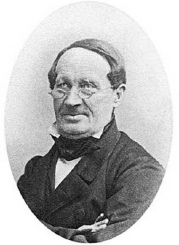Karl Ernst Claus
Karl Ernst Claus ( Russian Карл Карлович Клаус / Karl Karlovich Klaus ; born January 11, jul. / 22. January 1796 greg. In Tartu , † March 12 jul. / 24. March 1864 greg. ) Was a German-Russian pharmacist and the chemist who discovered ruthenium . He was also active in botany. His author's abbreviation for botanists and mycologists was Claus .
Life
Karl Ernst Claus came from a German-Baltic family. He worked as a pharmacist in Saint Petersburg and Kazan . In 1828 he joined a scientific expedition to the Urals as a draftsman . He painted and collected plants and minerals. During this expedition he got to know metal processing and began to be interested in mining , metal extraction and chemistry. He wrote his dissertation on the biochemistry of plants at the University of Kazan . In 1839 he was appointed professor at the Kazan University. His work was now on the chemistry of platinum metals . Using chemical methods, he was able to extract usable platinum from the dumps of platinum mining . In 1844 he isolated the lightest platinum metal and named it ruthenium , after his fatherland (lat. Ruthenia , depending on the context, denotes the Kiever Rus , the Polish-Lithuanian Union, forerunner of the Ukraine or the later, Moscovite Russia). From 1852 he was Professor of Pharmacy at the University of Dorpat . From 1863 he was a corresponding member of the Prussian Academy of Sciences .
literature
- Carl Schmidt : Prof. Dr. Carl Claus, a picture of life . New Repertory for Pharmacie 13 (1864), pp. 565-574 ( full text in the Google book search)
- Alphons Oppenheim: Claus, Karl . In: Allgemeine Deutsche Biographie (ADB). Volume 4, Duncker & Humblot, Leipzig 1876, p. 284.
- Berthold Peter Anft: Claus, Karl Ernst. In: New German Biography (NDB). Volume 3, Duncker & Humblot, Berlin 1957, ISBN 3-428-00184-2 , p. 269 f. ( Digitized version ).
- VN Pitchkov: The Discovery of Ruthenium. Platinum Metals Review 40 (1996), pp. 181-188 ( pdf ).
Web links
- Baltic Historical Commission (ed.): Entry on Karl Ernst Claus. In: BBLD - Baltic Biographical Lexicon digital
Individual evidence
- ↑ Dissertation: Fundamentals of analytical phytochemistry .
- ^ Members of the previous academies. Karl Ernst Claus. Berlin-Brandenburg Academy of Sciences and Humanities , accessed on March 9, 2015 .
| personal data | |
|---|---|
| SURNAME | Claus, Karl Ernst |
| ALTERNATIVE NAMES | Klaus, Karl Karlowitsch; Клаус, Карл Карлович (Russian) |
| BRIEF DESCRIPTION | German-Russian pharmacist and chemist |
| DATE OF BIRTH | January 22, 1796 |
| PLACE OF BIRTH | Dorpat |
| DATE OF DEATH | March 24, 1864 |
| Place of death | Dorpat |
